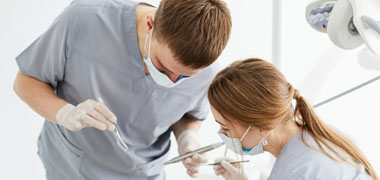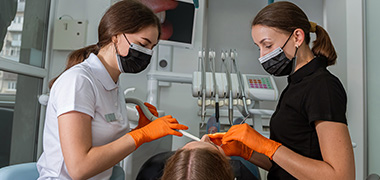
This role has a low level of AI exposure. Core skills such as adaptability, social intelligence, and complex physical tasks remain beyond the capabilities of current AI.
Explore all careersA Dental Nurse assists dentists with patient care, prepares equipment, operates instruments, and manages administrative tasks, requiring strong communication and attention to detail.
Get qualified to work as a Dental Nurse with a course recognised across Australia. Speak to a training provider to learn more.
Browse occupations related to Dental Nurse
In Australia, a full time Dental Nurse generally earns $1,300 per week ($67,600 annual salary) before tax. This is a median figure for full-time employees and should be considered a guide only. As you gain more experience you can expect a potentially higher salary than people who are new to the industry.
 Courses.com.au Team
Courses.com.au Team
The number of people working as a Dental Nurse has grown strongly in recent years. There are currently 31,900 people employed in this role in Australia compared to 17,100 five years ago. Dental Nurses may find work across all regions of Australia.
Source: Australian Government Labour Market Insights
 Courses.com.au Team
Courses.com.au Team
If you’re thinking of starting a career as a Dental Nurse, consider enrolling in a Certificate IV in Dental Assisting. This qualification will prepare you to work in a dental practice with topics such as patient preparation, infection control, dental radiology and practice administration. This course involves a work placement and you may be able to specialise in an area of interest such as oral health promotion or radiography.
 Courses.com.au Team
Courses.com.au Team



A Dental Nurse assists dentists as they provide oral health treatment to patients. You might get patients ready for their treatment and work alongside dentists during procedures. Dental Nurses may prepare equipment for treatments and they might operate some dental instruments such as suction tools. You might speak with patients about their dental care or perform administrative duties such as booking appointments or taking payments.
Dental Nurses need to have excellent personal skills and be able to communicate with a range of patients. You’ll need good attention to detail and should be able to follow directions closely. It’s important that you are passionate about dental care and can demonstrate this to your patients.